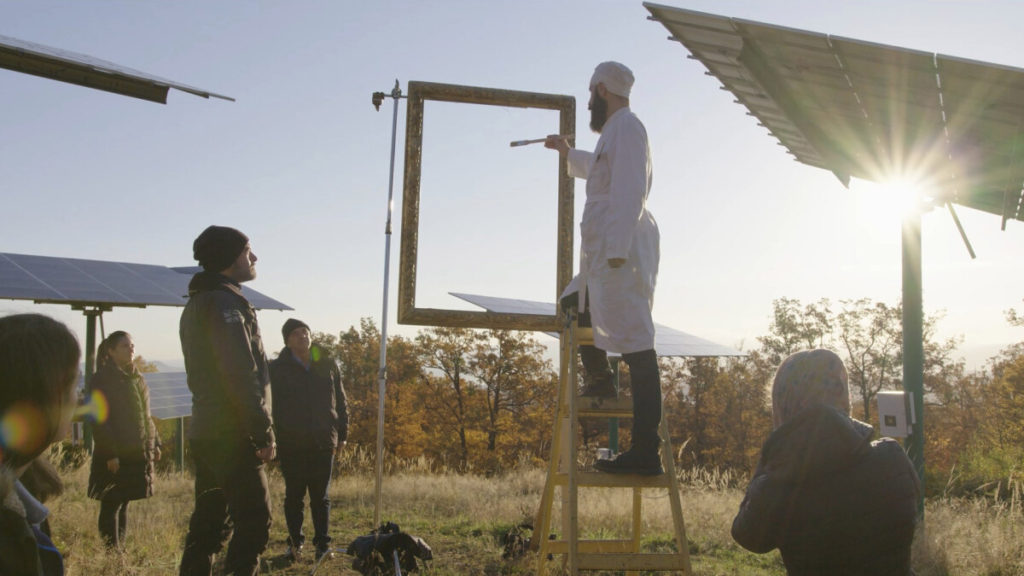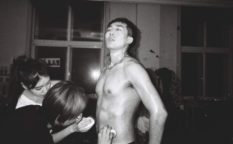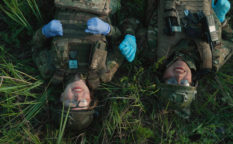Review: Arsenie. An Amazing Afterlife (2023)

The opening of Alexandru Solomon’s unorthodox documentary Arsenie. An Amazing Afterlife about a priest who rose to fame for his ‘magic powers’ during the Caucescu regime, could have easily come from any of the neighbouring countries that have been going through the ‘renaissance’ of the orthodox christian religion. Adressing his congregation, a priest is talking about the dangers lurking from ‘them’, and about marriage betwen men and women being the only acceptable union. He will use the name of Arsenie Boca as an extra weapon to speak about the only true religion.
Curious to understand the popularity of a priest who, despite of a life full of controversy, including being expelled from the church for a period of time, became a cult figure, Alexandru Solomon has organised his own pilgrimage in the company of believers, casted for the film. People who joined him on the trail of Arsenie Boca had already had some form of experience in front of the camera, but also – unlike Solomon – a strong personal attachment to the ‘holy father’s life and work. Divergent in their standpoints, the pilgrims represent three generations of people with different background, both socially and economically seen. In breaks between diverse statons of their pilgrimage, they are asked to act out diverse scenes from Boca’s life, including his alleged miracles, like the one in which the sparks were sent flying from his beard while he was combing it. Solomon uses props that are being tagged along, but he also dresses a couple of his travellers in historic (not only) robes, and the only person who will turn out not to be that religous, is the young man who happens to be presenting Boca himself. His appearance will anger the head priest of the Draganescu Church famous for the ‘saint’s paintings, who will on the account of it ban not just the shooting, but also pilgrims’ access to the premises. “One can not dress as Boca”, he is quoted saying. The offbeat form of theatre miniatures also involves out-loud reading of Securitate files…
Right at the beginning of the film, we are given a bit of the background story, explaining how the centenary of the unification of the historical provinces with the Romanian Kingdom in 2018 became the right ocasion to call for Boca’s canonisation. If this will ever happen stays uncertain. Although his popularity is unshakeable and the support by Romanian media huge, the church is hesitant due to Arsenie Boca’s brief period of dandy life when he took of the priest’s robe and shared an apartment with a nun, but also due to his religious paintings that are not according to the Orthodox iconography. The church leaders also find Boca’s oposition to the communist regime to weak. the widely spread rumours that we was killed by the communist regime, he died of natural causes in Sinaia monastery. This historical fact will be denied by some of the pilgrims, who come up with a number of conspiracy theories.
During the bus trip to places where the priest was born and lived, to those of worship, marketing and historical meaning (among others, monasteries Sâmbăta de Sus and Prislop, and a monument in Poarta Albă which commemorates the lives of political prisoners who were held in labour camps), Salomon is gradually deconstructing myths in his traditional manner, but neither does he succee in changing anyone’s opinion, nor does he manage (what he openly admits towards the end) to resolve the mystery of Boca’s enormous fame. Not even the obvious link between him, his fellow Orthodox Church priests and the fascist Legionary Movement founded by Corneliu Codreanu makes anyone blink. Solomon who matter-of-factly admits that he can’t be objective because he is of Jewish background, is calmly listening to clumsy attempts at justification of the incomprehensible.
In his press notes, Salomon speaks of Father Arsenie as a phenomenon issued from the endless post-communist «transition » that is taking place since 1989. He became a superhero who can erase wordly problems if one only knows how to ask him for help through prayers.
Original Title: Arsenie. Viața de apoi
Country: Romania
Language: Romanian
Runtime: 96′
Director, writer: Alexandru Solomon
Producers: Ada Solomon, Diana Caravia
Cinematography: Tudor Platon, Marius Bes
Sound Recording: Marin Cazacu, Mirel Cristea
Sound Editing: Dragoș Cătărău
Sound Design: Alin Zăbrăuțeanu
Dialogue Editing and Premix: Alexandru Dumitru
Mixing: Thomas Besson
Original Music: Alin Zăbrăuțeanu
Handpan and flute improvisation: Andrei Coteț
a microFILM production in co-production with Paul Thiltges Distributions
Editors: Catalin Cristutiu, Sophie Reiter
Sound design, original music: Alin Zabrauteanu
Production companies: MicroFILM (Romania), Paul Thiltges Distributions (Luxembourg)
Sales: MicroFILM
Venue: Karlovy Vary International Film Festival (Proxima competition)
















